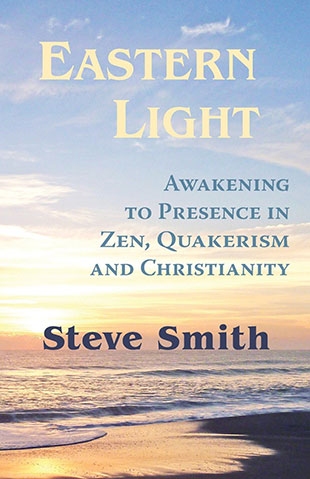Multiple religious participation (MRPing) is the conscious use of the ideas, practices, and sensibilities of another tradition by a person firmly rooted in his or her own faith perspective. In this serious, subtle, wise, and capacious spiritual memoir, Steve Smith shares his journey and sparks our attention to the bounties and insights of Quakerism, Zen, and Christianity.
Born into an Iowa Quaker farm family and graduated from Scattergood Friends School and Earlham College; he earned a doctorate in Philosophy from Harvard University, He taught for 40 years in the Department of Philosophy and Religious Studies at Claremont McKenna College. Among his publications are three edited books, a textbook, and two collections of talks by Zen teacher Charlotte Joko Beck.
Having been a teacher, Smith highlights five principles of Quaker pedagogy:
- The priority of experience: Awaken fully to our encounters with the world.
- Integrity: Link education consistently with the whole of life.
- The facts are friendly: Trust that creation is welcoming and life-affirming.
- Invite all voices: Include all in the community of learning.
- Nonviolence: Respect the tender souls of teachers and learners alike.
These bold educational ideals vividly illustrate some of the touchstones of Quaker faith and practice which Smith presents in Eastern Light. During a period in his life where he faced personal crises such as alcoholism and divorce, Smith immersed himself in a daily Zen meditation program which resulted in the transformation of his life. In his personal journal, he writes: "Zazen is marvelous. It returns me to myself, and to the unspeakable beauty at the heart of all things."
Like Paul Knitter, who talks often about how Buddhist practices have deepened and enriched his Christianity, Smith observes: "My Zen journey has helped me to appreciate features of Quaker spiritual practice that I had formerly overlooked."
In a series of cogent musings, the author ponders the abundant riches of standing still in the Light which demands, as was clarified by early Quakers in their writings, the rigors of dying to self and the liberation of discipline. Smith finds it rewarding to follow the mantra of George Fox "Live in the Life of God, and feel it." In a chapter probing passion and compassion, he looks at the vulnerability of human beings as they give themselves over to self-examination and a close encounter with their heart's desires.
For Smith, one of the many remarkable dimensions of Quakerism is its advocacy of activism. This spiritual path not only helps us bear the burdens of our own lives and keep our souls alive but the Religious Society of Friends (founded by George Fox) has been at the forefront of campaigns for peace and social justice around the world. Smith salutes the courage of Quakers who have suffered as a result of their espousal of peace over the engines and weapons of war. We were moved by the author's stirring defense of a nonviolent response to war, hatred, and injustice in the chapter on "Living Peace." This is followed by another aspect of peacemaking in the war of the sexes. Smith manages to convey the "joy of gender healing."
In the last three chapters, the author hits high stride by addressing the major challenges of our times: climate change and environmental decay; the daunting mission of "mending the world"; and the struggle to stay grounded, open, and compassionate in the kingdom of heaven as it exists right now within the everyday precincts of our lives. As he concludes:
"Spiritual practice is not a search for something that is absent from our lives. Rather, it is the discipline of reawakening to a Reality that is forever infused within us — a Sacred Source in which even now, in this very moment, we 'live and move and have our being.' "
